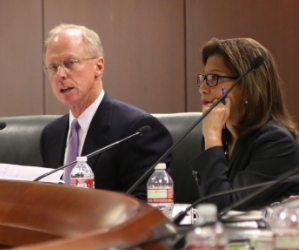Council Approves Retirement of Separate Name for Staff Agency
Contact: <a href="mailto:teresa.ruano@jud.ca.gov">Teresa Ruano</a>, 415-865-7740
July 29, 2014
Judicial Council Approves Retirement of Separate Name for Staff Agency

SAN FRANCISCO—At its public meeting on July 29, the Judicial Council approved recommendations to amend rules of court to retire use of the name Administrative Office of the Courts (AOC) for its staff. Chairs of the council’s five internal committees developed the rule change recommendations at the direction of the Chief Justice, to clarify the relation between the council and the staff that supports it by carrying out its policies and directives in service to the council, its advisory bodies, the courts, and the public. The recommendations also include direction to the Administrative Director to implement the name change expeditiously and cost-effectively. Listen (13:39)
Justice Harry E. Hull, Jr, chair of the council’s Rules and Project’s Committee, called the change “A move that makes a great deal of sense. For years, there has been confusion over the relationship between the administrative office and the council; that the staff of the council was a separate entity and in some way independent of the council. It’s time to end that confusion.” Justice Hull noted that the rule changes “merely retire the name without changing the functions, duties, responsibilities or obligations of the council or its staff.”
Fiscal Year 2014–2015 Budget
The council approved, with amendments, several budget-related recommendations for fiscal year 2014–2015 from its Trial Court Budget Advisory Committee:
Funding for General Court Operations and Specific Costs: The council allocated $1.622 billion for general operations of the trial courts from the Trial Court Trust Fund and General Fund, including $41 million in new funding for increases to employee benefits and $86.3 million in new funding for general court operations. The council approved allocation recommendations consistent with the Workload-Based Allocation and Funding Methodology, which is being phased in gradually over five years; this is year two. The council has until January of the fiscal year to finalize allocations.
The council discussed at length a variety of alternatives to deal with a projected $22.7 million shortfall in the Trial Court Trust Fund. It ultimately approved a preliminary base allocation of $1.534 billion from the Trial Court Trust Fund and General Fund appropriation under the assumption that any revenue shortfall that supports the base allocation will not be fully backfilled or funded. At the same time, the council directed the Administrative Director to submit a formal deficiency request to the Department of Finance for backfill of the shortfall by the state General Fund.
Allocations from State Trial Court Improvement and Modernization Fund: The council approved a staff proposal, directed by the council at its June meeting, to adjust allocations from this fund to close a projected shortfall.
Allocation Process for 2 Percent State-Level Reserve: The council directed the budget advisory committee to refine options for the allocation process for the 2 percent state-level reserve in the Trial Court Trust Fund—established to address unexpected revenue shortfalls and unforeseen emergencies—and to return to the council with recommendations in October.
In addition, the council decided to continue suspension until December 31, 2014—rather than terminate—the minimum operating and emergency fund balance policy, first suspended by the council for two years in August 2012. The policy has been superseded by statutory changes establishing the 2 percent state-level reserve and capping at 1 percent the fund balances that trial courts can carry forward from one year to the next.
Trial Court Facilities
The council’s other actions at the meeting included approving two recommendations related to facilities:
Fiscal year allocation recommendations from the council’s Trial Court Facility Modification Advisory Committee for statewide trial court facility modifications and planning. The $65 million appropriated by the Legislature will support planning, emergency projects, and the most critical facility modification needs. The committee pointed out, however, that inadequate funding in this area means that the judicial branch must continue to defer needed facility modifications.
A recommendation from the council’s Court Facilities Advisory Committee for legislation needed to use $40 million in one-time cash available this fiscal year for court construction projects. The council will sponsor legislation to appropriate approximately $27 million for architectural design of the New Sacramento Criminal Courthouse, which—if enacted—would enable the project to proceed into its next phase. The project must undergo cost reduction review now required of all court construction projects, and its construction will require enactment of future funding legislation. The council directed the Court Facilities Advisory Committee to review feasible options for use of any remaining funds and report back to the council.
###
